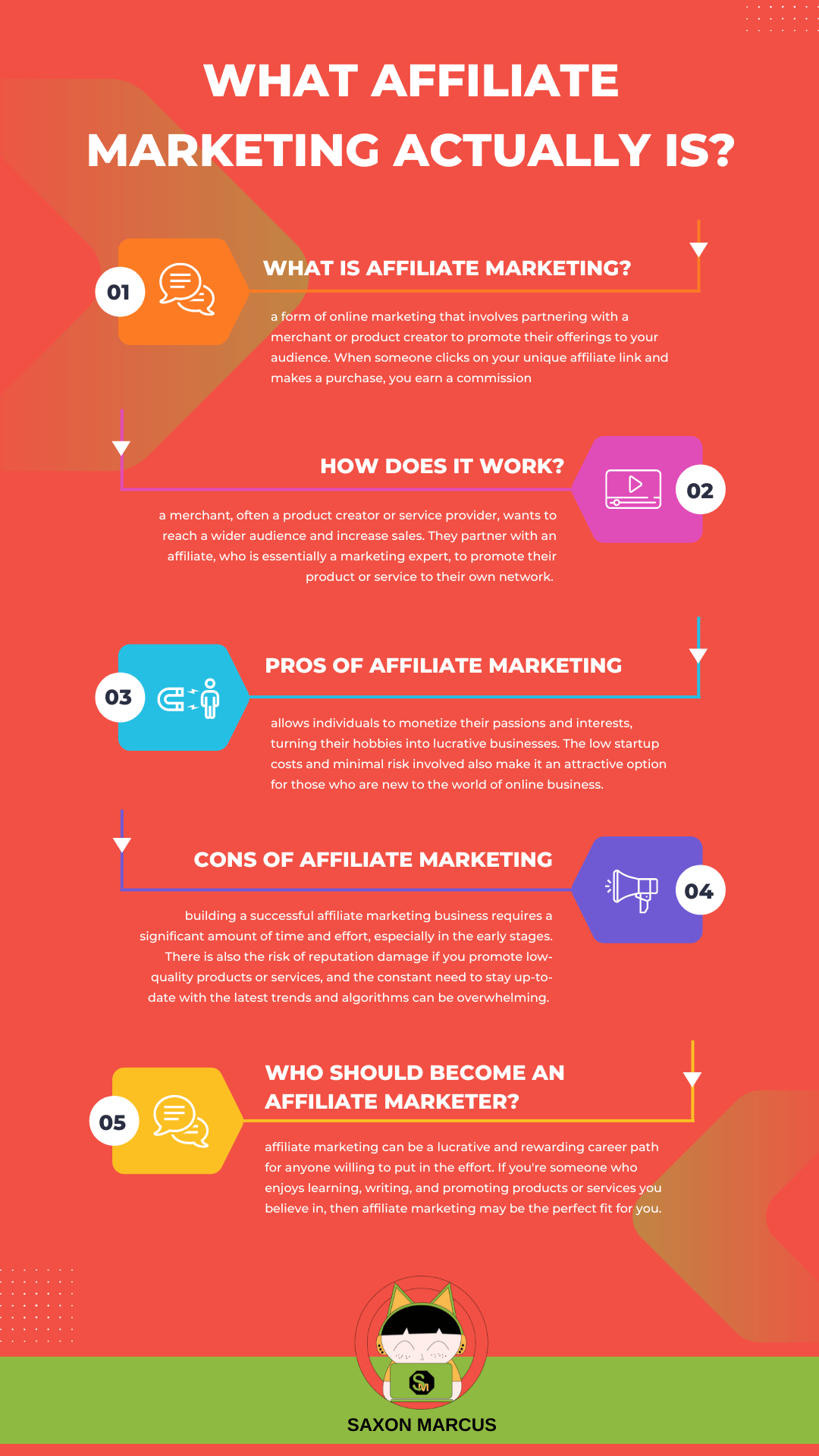
The allure of affiliate marketing is undeniable – the promise of earning a passive income, working from the comfort of your own home, and living the digital nomad lifestyle has captivated countless individuals. But beneath the glossy exterior of affiliate marketing lies a complex and often misunderstood reality.
While some tout it as a get-rich-quick scheme, others warn of its pitfalls and disappointments. As the industry continues to evolve, it’s essential to separate fact from fiction, and to delve beyond the hype to uncover the unvarnished truth.
In this blog post, we’ll strip away the myths and misconceptions, and provide a candid look at the realities of affiliate marketing. From the harsh truths about competition and saturation, to the often-overlooked importance of building a loyal audience, we’ll explore the real challenges and opportunities that lie at the heart of this lucrative industry.
WHAT IS AFFILIATE MARKETING?
Imagine being able to earn money from the comfort of your own home, without having to create your own products or services. Sounds like a dream, right? That’s exactly what affiliate marketing is – a way for individuals to earn commissions by promoting other people’s products or services.
At its core, affiliate marketing is a form of online marketing that involves partnering with a merchant or product creator to promote their offerings to your audience. When someone clicks on your unique affiliate link and makes a purchase, you earn a commission.
In this model, you, as an affiliate marketer, act as a bridge between the product creator and the potential customer. You promote the product through various marketing channels and earn a commission for each sale or referral generated through your efforts.
It’s a win-win situation for both parties – the merchant gets more visibility and sales, and you get to earn a passive income. With the rise of online shopping and digital marketing, affiliate marketing has become a lucrative industry, with millions of people around the world making a living from it.
Whether you’re a blogger, influencer, or entrepreneur, affiliate marketing can be a powerful way to monetize your online presence and achieve financial freedom.
How Does Affiliate Marketing Work?
At its core, affiliate marketing is a win-win partnership between a merchant, an affiliate, and a customer.
Here’s how it works: a merchant, often a product creator or service provider, wants to reach a wider audience and increase sales. They partner with an affiliate, who is essentially a marketing expert, to promote their product or service to their own network.
The affiliate earns a commission for each sale, referral, or lead generated through their unique affiliate link. The customer, meanwhile, gets access to a valuable product or service that solves a problem or meets a need.
The affiliate marketer acts as a bridge between the merchant and the customer, promoting the product through various channels such as social media, blogging, or email marketing. When a customer clicks on the affiliate link and makes a purchase, the affiliate earns a commission, and the merchant gets a sale. It’s a simple yet powerful concept that has revolutionized the way products are marketed and sold online.
3 Types Of Affiliate Marketing
As a beginner in the world of affiliate marketing, it’s essential to understand the different types of affiliate marketing that exist. This knowledge will help you navigate the industry and choose the path that best suits your goals and target audience.
There are three primary types of affiliate marketing: Unattached, Related, and Involved.
Unattached affiliate marketing is a low-risk, low-reward approach where you promote products without any personal connection to the audience or the product. This type of affiliate marketing is often used by bloggers and social media influencers who promote products to their large following.
Related affiliate marketing, on the other hand, involves promoting products that are closely related to your niche or audience. This type of affiliate marketing builds trust with your audience and increases the chances of conversion.
Finally, Involved affiliate marketing is the most lucrative and time-consuming approach, where you develop a deep connection with your audience and promote products that you have used and loved. This type of affiliate marketing requires a high level of transparency and authenticity, but can lead to significant commissions and a loyal following.
Pros And Cons Of Affiliate Marketing
As with any business venture, affiliate marketing has its fair share of advantages and disadvantages. On the plus side, affiliate marketing offers a level of flexibility and freedom that is hard to find in traditional 9-to-5 jobs.
With the ability to work from anywhere and at any time, affiliate marketers can enjoy a sense of autonomy and independence that is hard to match.
Additionally, affiliate marketing allows individuals to monetize their passions and interests, turning their hobbies into lucrative businesses. The low startup costs and minimal risk involved also make it an attractive option for those who are new to the world of online business.
Furthermore, affiliate marketing provides an opportunity to build a passive income stream, allowing individuals to earn money while they sleep.
However, there are also some downsides to consider. One of the biggest challenges of affiliate marketing is the high level of competition, making it difficult to stand out in a crowded market.
Additionally, building a successful affiliate marketing business requires a significant amount of time and effort, especially in the early stages. There is also the risk of reputation damage if you promote low-quality products or services, and the constant need to stay up-to-date with the latest trends and algorithms can be overwhelming.
Despite these challenges, the benefits of affiliate marketing far outweigh the drawbacks, making it a lucrative and rewarding career path for those who are willing to put in the work.
Who Should Become An Affiliate Marketer?
Are you tired of living paycheck to paycheck, stuck in a 9-to-5 job with little freedom or flexibility? Or perhaps you’re a stay-at-home parent looking to supplement your family’s income without sacrificing precious time with your loved ones. Maybe you’re an entrepreneur at heart, eager to turn your passion into a profitable online business.
Whoever you are, affiliate marketing can be a lucrative and rewarding career path for anyone willing to put in the effort. If you’re someone who enjoys learning, writing, and promoting products or services you believe in, then affiliate marketing may be the perfect fit for you.
With minimal startup costs and the potential to earn passive income, affiliate marketing offers a unique opportunity to break free from the constraints of traditional employment and build a successful online business or creative marketing agency that can be run from anywhere in the world.
How Affiliate Marketers Make Money
The moment of truth – how affiliate marketers actually make money. It’s a question that has puzzled many a curious mind, and one that’s shrouded in mystery. But fear not, dear reader, for we’re about to lift the veil and reveal the secrets behind this lucrative online industry.
Affiliate marketers earn their keep by promoting products or services from other companies and earning a commission on each sale, referral, or lead generated through their unique affiliate link. It’s a win-win situation, where the affiliate marketer gets paid for promoting a product they believe in, and the company benefits from increased brand awareness and sales.
Typically, affiliates are rewarded for a sale. But some affiliate marketing programs can reward you for leads, free-trial users, clicks to a website, or getting downloads for an app.
The beauty of it lies in its simplicity – no need to create your own products, handle inventory, or worry about customer service. All you need to do is share your affiliate link with your audience, and the money starts rolling in. Of course, it’s not quite that easy, but with the right strategy, tools, and mindset, the possibilities are endless.
How To Choose The Right Niche And Products To Promote
Choosing the right niche and products to promote is a crucial step in your affiliate marketing journey. It’s the foundation upon which your entire business is built, and it can make all the difference between success and failure. Imagine building a house on shaky ground – it may look beautiful at first, but eventually, it will come crashing down.
Similarly, if you don’t choose a niche and products that resonate with your target audience, you’ll struggle to make sales and attract loyal followers. On the other hand, when you select a niche that you’re passionate about and products that solve real problems for your audience, you’ll be amazed at how effortlessly you can attract and engage with your target market.
The right niche and products will also give you a sense of purpose and direction, helping you to stay focused and motivated as you navigate the ups and downs of affiliate marketing. So, how do you choose the right niche and products?
It starts with understanding your target audience, identifying their pain points, and researching products that offer solutions to those problems. By doing so, you’ll be able to create content that resonates, promote products that convert, and build a loyal following that will drive your affiliate marketing success.
Affiliate Program Examples
When it comes to affiliate marketing, the possibilities are endless. From wellness and finance to technology and travel, there’s a vast array of affiliate programs out there waiting to be tapped into.
For example, Amazon Associates is one of the most popular and lucrative affiliate programs, with millions of products to promote and a reputation for reliability. Commission Junction, on the other hand, offers a vast network of brands and products, including well-known names like Target and Home Depot.
ShareASale is another popular option, with thousands of products and merchants to choose from, and a user-friendly interface that makes it easy to get started. And then there’s Rakuten, a global affiliate network with a diverse range of brands and products, from fashion and beauty to electronics and more.
These are just a few examples of the many affiliate programs available, and the right one for you will depend on your niche, audience, and goals. With so many options to choose from, it’s easier than ever to find an affiliate program that aligns with your brand and helps you achieve success.

THE ALLURING PROMISE OF AFFILIATE MARKETING
The allure of affiliate marketing is undeniable. Who wouldn’t want to earn a steady stream of passive income, working from the comfort of their own home, with minimal upfront costs and no product inventory to worry about?
The promise of affiliate marketing is tantalizing: simply promote other people’s products, earn a commission for each sale made through your unique referral link, and watch the money roll in. It’s a tantalizing dream, especially for those who have been burned by the 9-to-5 grind or are seeking a more flexible and lucrative career path.
Affiliate marketing gurus and online courses promise the world: “Make $10,000 a month with just a few hours of work!” or “Quit your job and live the lifestyle of your dreams!” The idea that you can build a lucrative online business with minimal effort and maximum return is incredibly appealing. And it’s true – some people do make a killing in affiliate marketing. But what the glossy sales pages and hyped-up webinars don’t tell you is that success in affiliate marketing requires a lot more than just slapping up a website and promoting a few products.
It takes hard work, dedication, and a deep understanding of your audience and the market. The reality is, affiliate marketing is not a get-rich-quick scheme, but a legitimate business that requires effort, patience, and persistence.
The Harsh Reality: What They Don’t Tell You
Behind the glamorous promises of passive income and lavish lifestyles, lies a harsh reality that many affiliate marketers dare not speak of. The truth is, affiliate marketing is not a get-rich-quick scheme, and success is not as easy as slapping up a website and waiting for the commissions to roll in. In fact, the vast majority of affiliate marketers struggle to make ends meet, let alone achieve financial freedom.
The reality is that affiliate marketing is a highly competitive space, where thousands of marketers are vying for the attention of a limited audience. The noise is deafening, and it’s easy to get lost in the crowd. The odds are stacked against you, and even the most seasoned marketers face rejection, disappointment, and frustration.
Moreover, the affiliate marketing landscape is constantly evolving, with algorithms changing, programs shutting down, and new regulations as well as internet marketing services emerging. It’s a game of cat and mouse, where you need to stay one step ahead of the competition to survive. The successful affiliate marketers are the ones who are willing to put in the hard work, adapt to the changes, and continuously learn and improve their strategies. But for every success story, there are countless others who are left in the dust, wondering what went wrong.
Debunking The Myths: Get Rich Quick Schemes
The allure of overnight wealth and effortless riches is a tantalizing prospect that has lured many into the world of affiliate marketing. The idea that you can simply sign up for a program, slap up a few ads, and watch the money roll in is a tantalizing fantasy that has been perpetuated by get-rich-quick schemes and unrealistic promises. But the truth is, affiliate marketing is hard work, and success rarely happens overnight.
The reality is that building a successful affiliate marketing business takes time, effort, and dedication. It requires a deep understanding of your target audience, a well-crafted marketing strategy, and a willingness to continuously adapt and improve. It’s not about throwing up a few affiliate links and waiting for the cash to pour in; it’s about building a real business that provides value to your customers and solves their problems.
Those who promise overnight riches or guaranteed success are often more interested in selling you a dream than in helping you build a sustainable business. They prey on the hopes and desires of unsuspecting individuals, leaving them with empty promises and a lighter wallet. The truth is, there is no shortcut to success, and anyone who tells you otherwise is likely trying to sell you something.
The Dark Side Of Affiliate Marketing: Low Commissions And High Competition
Behind the glamorous promises of passive income and financial freedom, lies a harsh reality that many affiliate marketers dare not speak of. The truth is, the majority of affiliate programs offer commissions that are barely enough to cover a cup of coffee, let alone a luxurious lifestyle.
The average commission rate hovers around 5-10%, which means you’ll need to sell a staggering amount of products to make a decent income. And to make matters worse, the competition is cutthroat. With millions of affiliates promoting the same products, the market is saturated, and the noise is deafening. It’s a dog-eat-dog world where only the most skilled and ruthless marketers survive.
The brutal competition drives down conversion rates, making it even harder to earn a living. Add to that the fact that many programs have strict rules and regulations, and it’s easy to see why many affiliates end up feeling frustrated, disillusioned, and ultimately, defeated. The harsh reality is that affiliate marketing is not a get-rich-quick scheme, but a grueling marathon that requires dedication, perseverance, and a willingness to learn from your mistakes.
The Importance Of Building A Loyal Audience
Building a loyal audience is the backbone of a successful affiliate marketing strategy. It’s the secret sauce that separates the flash-in-the-pan affiliates from the ones who build sustainable, long-term businesses. Why? Because a loyal audience trusts you, values your opinion, and is more likely to take action on your recommendations.
They’re not just fly-by-night visitors who click on your link and then disappear into the ether. A loyal audience is an invested audience, one that has been nurtured and cultivated over time through consistent, high-quality content, engagement, and transparency.
When you have a loyal audience, you can promote products like digital marketing templates with confidence, knowing that they’ll be receptive to your message. You can also get honest feedback, which is invaluable in refining your marketing strategy.
Moreover, a loyal audience will advocate for you, sharing your content and recommending your site to others, thereby amplifying your reach and influence. In short, a loyal audience is the key to building a loyal customer base, and that’s the foundation upon which successful affiliate marketing empires are built.
Why Affiliate Marketing Is Not A Passive Income Stream
The sweet allure of passive income – it’s a siren song that has lured many into the world of affiliate marketing. Who wouldn’t want to earn money while they sleep, travel, or simply lounge on the beach? Unfortunately, the reality of affiliate marketing is far more nuanced.
While it’s true that affiliate marketing can generate income without requiring your direct involvement, it’s not a set-it-and-forget-it proposition. In fact, affiliate marketing requires a significant amount of upfront effort, ongoing maintenance, and continuous optimization to remain profitable.
Think about it: your affiliate links, website, and social media channels need to be constantly updated with fresh content to attract and engage your audience. You need to stay on top of industry trends, product updates, and changes in consumer behavior to ensure your promotions remain relevant and effective. And let’s not forget about the ever-present threat of affiliate program changes, commission structure updates, and even account bans. In short, affiliate marketing is a dynamic, high-maintenance endeavor that demands your active involvement to succeed.
So, while affiliate marketing can be a lucrative and fulfilling venture, it’s essential to dispel the myth that it’s a passive income stream. Be prepared to roll up your sleeves, invest time and effort, and continually adapt to the evolving landscape of affiliate marketing. Only then can you reap the rewards of this lucrative online opportunity.
The Role Of Trust And Credibility In Affiliate Marketing
Trust and credibility are the cornerstones of a successful affiliate marketing strategy. Without them, you’re just another loud voice in a crowded marketplace, shouting about the latest and greatest products to anyone who will listen. But with trust and credibility, you’re a respected authority, a trusted friend who offers sage advice and genuine recommendations. Your audience hangs on your every word, because they know that you’ve done the research, that you’ve vetted the products, and that you’re only suggesting the best.
When you’ve built trust with your audience, they’re more likely to click on your affiliate links, to buy the products you recommend, and to share your content with their friends and family. They’re more likely to forgive you when you make a mistake, and to stick with you through thick and thin. And, perhaps most importantly, they’re more likely to become loyal fans, who will follow you wherever you go, and who will advocate for your brand to anyone who will listen.
But trust and credibility aren’t built overnight. They take time, effort, and consistency. They require you to be transparent, to be honest, and to be vulnerable. They require you to put your audience’s needs before your own, and to always, always put their interests first. And, in the end, they’re the key to building a successful affiliate marketing business that will stand the test of time.
The Truth About Affiliate Marketing Programs And Networks
Behind the glamor of affiliate marketing lies a complex web of programs and networks that can be overwhelming for newcomers. The truth is, not all affiliate programs are created equal. While some offer lucrative commissions and timely payouts, others are plagued by delays, low payouts, and restrictive terms. Moreover, the proliferation of affiliate networks has created a fragmented landscape where it’s easy to get lost in the noise.
Some programs are notoriously difficult to join, with strict approval processes and high barriers to entry. Others are more accessible, but come with strings attached, such as minimum sale requirements or narrow product ranges. And then there are the networks that promise the world but fail to deliver, leaving affiliates frustrated and disillusioned.
To succeed in affiliate marketing, it’s essential to separate the wheat from the chaff. You need to do your due diligence, researching programs and networks thoroughly to ensure they align with your goals and values. Don’t be swayed by flashy promises or get-rich-quick schemes. Instead, focus on building relationships with reputable programs and networks that offer fair commissions, reliable tracking, and timely payouts. Only then can you build a sustainable affiliate marketing business that generates real income and delivers on its promises.
The Hidden Costs Of Affiliate Marketing
The hidden costs of affiliate marketing – the elephant in the room that no one wants to talk about. While the promise of earning passive income and living the laptop lifestyle is enticing, the reality is that affiliate marketing comes with a slew of expenses that can quickly eat into your profits.
From the cost of creating high-quality content to the fees associated with promoting products on social media, the expenses can add up quickly. And let’s not forget about the tools and software you need to track your campaigns, manage your affiliates, and optimize your website for conversions. Then there’s the cost of attending conferences and workshops to stay up-to-date on the latest industry trends and best practices.
Not to mention the time and money you’ll spend on testing and optimizing your campaigns, only to find that they don’t perform as well as you had hoped. The truth is, affiliate marketing is a business that requires a significant investment of time, money, and resources. So, before you jump in, it’s essential to have a clear understanding of the hidden costs involved and to factor them into your business plan.
How To Succeed In Affiliate Marketing: A Realistic Approach
Succeeding in affiliate marketing requires a clear-eyed understanding of what it takes to thrive in this competitive landscape. It’s not about getting rich quick or making a fortune overnight. Rather, it’s about rolling up your sleeves, putting in the hard work, and being willing to continuously learn and adapt.
First and foremost, you need to be realistic about your goals and expectations. Affiliate marketing is a marathon, not a sprint. It takes time to build a loyal audience, create valuable content, and promote products that resonate with your followers. Don’t expect to wake up one morning and find your bank account overflowing with commissions. Instead, focus on making steady progress, day by day, week by week.
Next, you need to be willing to put in the effort required to create high-quality content that resonates with your audience. This means doing your research, staying up-to-date on the latest trends and products, and crafting content that educates, entertains, and inspires. It’s not about churning out low-quality content just to meet a quota; it’s about creating something that adds real value to people’s lives.
Finally, you need to be prepared to adapt to changes in the market and the industry. Affiliate marketing is constantly evolving, with new trends, products, and platforms emerging all the time. To succeed, you need to be flexible and willing to pivot when necessary. This means staying curious, seeking out new knowledge and skills, and being open to new opportunities and challenges.
By taking a realistic approach to affiliate marketing, you’ll be better equipped to navigate the ups and downs of this competitive industry and build a successful, sustainable business that generates real income and value over time.
The Importance Of Transparency And Disclosure
In the world of affiliate marketing, transparency and disclosure are not just moral obligations, but legal requirements. The Federal Trade Commission (FTC) has strict guidelines in place to ensure that affiliate marketers clearly disclose their relationships with product creators and vendors. This means that affiliate marketers must explicitly reveal their affiliation with a product or service, and clearly indicate when a review or endorsement is sponsored.
But transparency and disclosure go beyond mere compliance with regulations. They are essential for building trust with your audience, and maintaining a reputation that is authentic and credible. When you are open and honest about your affiliations, you demonstrate a commitment to integrity and fairness, and you establish a foundation of trust with your audience. This, in turn, can lead to increased engagement, loyalty, and ultimately, conversions.
Moreover, transparency and disclosure can also help to mitigate the risk of negative consequences, such as lawsuits, fines, and damage to your reputation. By being upfront and honest about your affiliations, you can avoid accusations of deception and manipulation, and maintain a positive and respectful relationship with your audience. In the world of affiliate marketing, transparency and disclosure are not just nice-to-haves, but must-haves.
Building A Sustainable Business Beyond Affiliate Marketing
The allure of affiliate marketing can be intoxicating, with its promises of passive income and effortless commissions. But, as we’ve explored throughout this post, the reality is often far more complex. While affiliate marketing can be a lucrative way to monetize your online presence, it’s essential to remember that it’s not a sustainable business model in and of itself. The truth is, affiliate marketing is just one piece of the puzzle, and relying solely on it can leave you vulnerable to the whims of commission rates, algorithm changes, and shifting consumer behaviors.
To build a truly sustainable business, you need to think beyond the affiliate marketing bubble. This means diversifying your income streams, building a loyal community, and creating value that extends far beyond a single product or promotion. It means investing in your own products, services, and intellectual property, rather than simply peddling someone else’s. It means building a brand that resonates with your audience, and forging relationships that are based on trust, authority, and mutual respect.
In short, it means creating a business that’s not beholden to the affiliate marketing gravy train, but rather one that’s built on a foundation of authenticity, creativity, and long-term value. By doing so, you’ll not only insulate yourself from the inevitable ups and downs of the affiliate marketing landscape, but you’ll also create a business that’s truly sustainable, scalable, and worthy of your passion and dedication.

CONCLUSION
As we’ve navigated the realities of affiliate marketing, it’s clear that the landscape is far more complex than the glossy promises of overnight riches and passive income streams. The truth is, affiliate marketing requires dedication, hard work, and a willingness to continuously adapt to an ever-changing industry. While the potential for success is undoubtedly there, it’s essential to separate the facts from the fiction and approach this venture with a clear-eyed understanding of what it takes to thrive.
By peeling back the layers of hype and misinformation, we’ve uncovered the often-overlooked aspects of affiliate marketing, from the importance of building trust with your audience to the need for transparency and compliance with regulatory guidelines. We’ve also explored the harsh realities of commission rates, cookie durations, and the cutthroat competition that exists in this space.
As you embark on your own affiliate marketing journey, remember that success is not a guarantee, but it is achievable with persistence, creativity, and a commitment to delivering value to your audience. By separating fact from fiction, you’ll be better equipped to navigate the challenges and opportunities that lie ahead, and ultimately, build a sustainable and profitable affiliate marketing business that stands the test of time.
As we’ve shed light on the often-misunderstood world of affiliate marketing, we hope you’ve gained a deeper understanding of the realities behind the glossy promises. By peeling back the layers of hype and misconception, we’ve revealed the authentic, unvarnished truth about this lucrative industry.
Armed with this newfound knowledge, you’re now empowered to make informed decisions and navigate the affiliate marketing landscape with confidence. Whether you’re a seasoned pro or just starting out, remember that success in affiliate marketing requires dedication, persistence, and a willingness to put in the hard work. So, go ahead, separate the fact from the fiction, and watch your affiliate marketing journey flourish.



